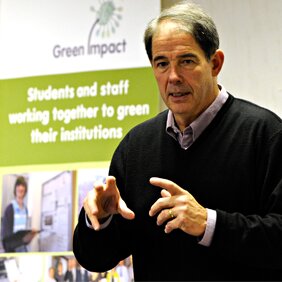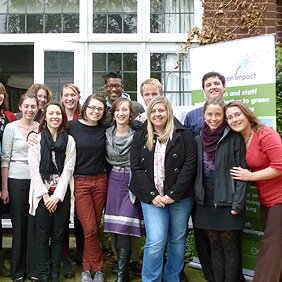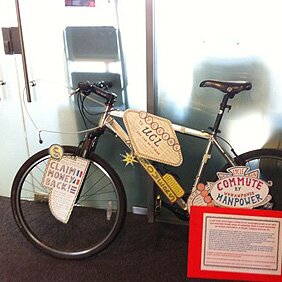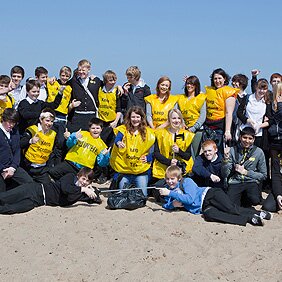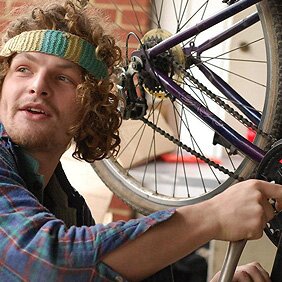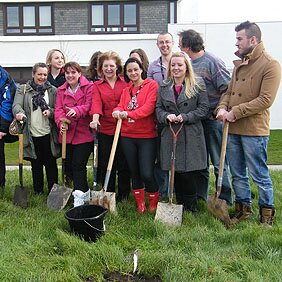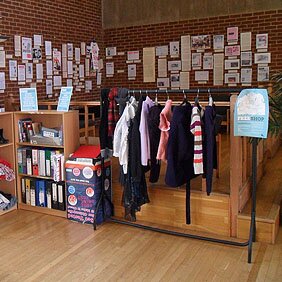Posted by admin in Uncategorized | 0 Comments
Exeter Guild of Students’ wins the Slow Food Better Eating award!
Exeter Guild of Student’s won the 2011/12 Slow Food Better Eating Award. A new addition to the Green Impact Students’ Unions special awards, the award proved to be very popular with students’ unions, with some great entries. Please find below the winning entry:
 Planting the seed: The Exeter Community Garden project was a direct result of Green Impact 2010-2011. During one of our Green Impact meetings our then President, Jonnie Beddall, posed a challenge to me as the chair of the group. The challenge was to find an empty field in University and start a small allotment. I proposed the idea to the Director of Grounds and he said he will loan us a patch of land in an unused field in campus. I wrote about this on our Green Impact newsletter and copied in the University’s Sustainability Manager and Director of Grounds. From there the newsletter went “viral” and other parties became interested in the idea which quickly became a project.
Planting the seed: The Exeter Community Garden project was a direct result of Green Impact 2010-2011. During one of our Green Impact meetings our then President, Jonnie Beddall, posed a challenge to me as the chair of the group. The challenge was to find an empty field in University and start a small allotment. I proposed the idea to the Director of Grounds and he said he will loan us a patch of land in an unused field in campus. I wrote about this on our Green Impact newsletter and copied in the University’s Sustainability Manager and Director of Grounds. From there the newsletter went “viral” and other parties became interested in the idea which quickly became a project.
Our mission: The Exeter Community Garden is a long term initiative established by members of the Students’ Guild, the University of Exeter and members of the Community. Its aim is simple: to further the causes of sustainability and biodiversity in Exeter. By harnessing our individual skills we endeavour to educate and equip our members with the knowledge and the skills necessary to enhance both our understanding of the natural environment and our ability to engage in it. We believe the issues of food security and sustainability, habitat protection and promoting biodiversity are fundamentally interlinked and essential to tackle major challenges locally and globally. The Exeter Community Garden is not just a physical space to grow food, plant and improve the habitat but an interchange of knowledge and ideas which we seek to harness for the good of our members and the wider community.
Timeline: The Exeter Community Garden was launched on 30 June 2011 by the Lord Mayor of Exeter Stella Brock. We invited University staff, students and the local community. It was a success and there was a palpable interest with our stakeholders. By August-September 2011 we were harvesting our crop and sharing it with our members. The University also indicated that when we are able to grow substantial amount of vegetables they will buy our produce and introduce them to their catering outlets. October-December 2011, we used the funding NUS Services relating to the University’s participation in Green Impact Universities for fencing and additional raised beds. On the back of this we were awarded grants from Natural England, Devon County Council, the University’s Sustainability Group, University Campus Services, the Vice-Chancellor and Registrar. So far we raised over £6000. We also had a presence at the Activities Fair where we engaged with over 100 students. Our Facebook page also documented our activities to keep in touch with our current and future members. November 2011 we convinced the local farmer who was leasing the field from the University to let us cultivate the land. By the end of November we planted heritage fruit trees from Devon and Somerset and started our orchard next to the Community Garden. The video of the planting is available on our website www.exetercommunitygarden.com or visit . Earlier this month- January 2012 the University chefs dedicated a day to install fencing around the new orchard and finished off the remaining raised beds. We have also applied for planning permission to build a shed on the site which will be big enough to hold Committee meetings. We are expecting it to be built by March 2012. We are now drawing up a calendar of activities for the year which will include joint projects with the Slow Food Movement, Grow your own, Health and Wellness and Healthy eating.
Recycling/Food waste/composting: From the start we intended to recycle as many items we could find. We were lucky to be able to use compost from one of the several ponds in University as a by-product of dredging work. We mixed the compost with soil and used this mixture on the raised beds. As a result fertilisers were not needed as the compost was quite rich. We also devised old tractor tyres as “raised beds” for our tomatoes and sweet peppers and adapted metal clips to secure our fencing. Wooden pallets were recycled to construct compost bins in order to produce our own compost. We also agreed to take part of a pilot from University that used food waste from our catering outlets to turn waste into rich compost. All in all very low carbon footprint.
Evidence: Students and staff working together on communal activities like tree/hedge planting and gardening. We are also active in student campaigns like Go Green Week, Slow Food on Campus, Birds and Bees campaign, Fair-trade Fortnight, Volunteering Week and National Student Money Week to introduce students to gardening, growing your own and various green initiatives. Students in College of Environment and Life Sciences have also been studying the project as part of their module researching the effects of communal gardening in the community. We will also supply the herbs to the Slow Food dinner event in February.
For further information please check our website www.exetercommunitygarden.com. We also have a presence in Facebook. ECG is supported by University of Exeter, Devon County Council and Natural England.
Submitted by: Norrie Blackeby, Lead, Green Impact University of Exeter Students’ Guild 2011-2012
30 January 2012

